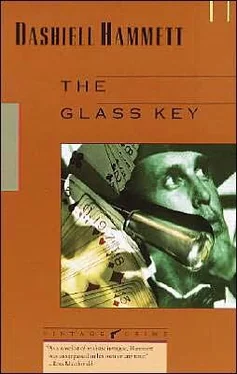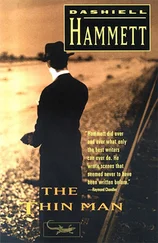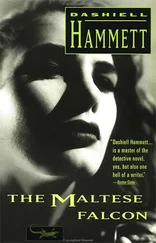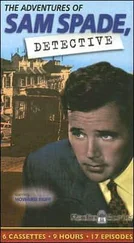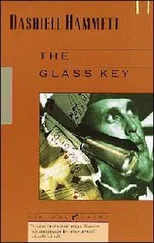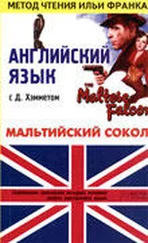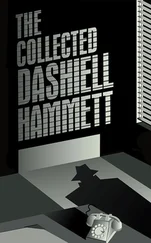She frowned. "But you must see— Never mind that now. I'll tell you what happened and you can see it for yourself." She continued to lean far forward, staring at his face with intent brown eyes. "He came to dinner, the first time we'd had him to dinner."
"I knew that," Ned Beaumont said, "and your brother wasn't there."
"Taylor wasn't at the dinner-table," she corrected him earnestly, "but he was up in his room. Only Father, Paul, and I were at the table. Taylor was going out to dinner. He—he wouldn't eat with Paul because of the trouble they'd had about Opal."
Ned Beaumont nodded attentively without warmth.
"After dinner Paul and I were alone for a little while in—in the room where you and I talked last night and he suddenly put his arms around me and kissed me."
Ned Beaumont laughed, not loudly, but with abrupt irrepressible merriment.
Janet Henry looked at him in surprise.
He modified his laugh to a smile and said: "I'm sorry. Go on. I'll tell you later why I laughed." But when she would have gone on he said: "Wait. Did he say anything when he kissed you?"
"No. That is, he may have, but nothing I understood." Perplexity was deepening in her face. "Why?"
Ned Beaumont laughed again. "He ought to've said something about his pound of flesh. It was probably my fault. I had been trying to persuade him not to support your father in the election, had told him that your father was using you as bait to catch his support, and had advised him that if he was willing to be bought that way he ought to be sure and collect his pound of flesh ahead of the election or he'd never get it."
She opened her eyes wide and there was less perplexity in them.
He said: "That was that afternoon, though I didn't think I'd had much luck putting it over." He wrinkled his forehead. "What did you do to him? He was meaning to marry you and was chock-full of respect and what not for you and you must have rubbed him pretty thoroughly the wrong way to make him jump at you like that."
"I didn't do anything to him," she replied slowly, "though it had been a difficult evening. None of us was comfortable. I thought—I tried not to show that—well—that I resented having to entertain him. He wasn't at ease, I know, and I suppose that—his embarrassment—and perhaps a suspicion that you had been right made him—" She finished the sentence with a brief quick outward motion of both hands.
Ned Beaumont nodded. "What happened then?" he asked.
"I was furious, of course, and left him."
"Didn't you say anything to him?" Ned Beaumont's eyes twinkled with imperfectly hidden mirth.
"No, and he didn't say anything I could hear. I went upstairs and met Father coming down. While I was telling him what had happened— I was as angry with Father as with Paul, because it was Father's fault that Paul was there—we heard Paul going out the front door. And then Taylor came down from his room." Her face became white and tense, her voice husky with emotion. "He had heard me talking to Father and he asked me what had happened, but I left him there with Father and went on to my room, too angry to talk any more about it. And I didn't see either of them again until Father came to my room and told me Taylor had— had been killed." She stopped talking and looked white-faced at Ned Beaumont, twisting her fingers together, awaiting his response to her story.
His response was a cool question: "Well, what of it?"
"What of it?" she repeated in amazement. "Don't you see? How could I help knowing then that Taylor had run out after Paul and had caught up with him and had been killed by him? He was furious and—" Her face brightened. "You know his hat wasn't found. He was too much in a hurry—too angry—to stop for his hat. He—"
Ned Beaumont shook his head slowly from side to side and interrupted her. His voice held nothing but certainty. "No," he said. "That won't do. Paul wouldn't've had to kill Taylor and he wouldn't've done it. He could have managed him with one hand and he doesn't lose his head in a fight. I know that. I've seen Paul fight and I've fought with him. That won't do." He drew eyelids closer together around eyes that had become stony. "But suppose he did? I mean accidentally, though I can't believe even that. But could you make anything out of it except self-defense?"
She raised her head scornfully. "If it were self-defense, why should he hide it?"
Ned Beaumont seemed unimpressed. "He wants to marry von," he explained. "It wouldn't help him much to admit he'd killed your brother even—" He chuckled. "I'm getting as bad as you are. Paul didn't kill him, Miss Henry."
Her eyes were stony as his had been. She looked at him and did not speak.
His expression became thoughtful. He asked: "You've only"—he wriggled the fingers of one hand—"the two and two you think you've put together to tell you that your brother ran out after Paul that night?"
"That is enough," she insisted. "He did. He must've. Otherwise— why, otherwise what would he have been doing down there in China Street bare-headed?"
"Your father didn't see him go out?"
"No. He didn't know it either until we heard—"
He interrupted her. "Does he agree with you?"
"He must," she cried. "It's unmistakable. He must, no matter what he says, just as you must." Tears were in her eyes now. "You can't expect me to believe that you don't, Mr. Beaumont. I don't know what you knew before. You found Taylor dead. I don't know what else you found, but now you must know the truth."
Ned Beaumont's hands began to tremble. He slumped farther down in his chair so he could thrust his hands into his trousers-pockets. His face was tranquil except for hard lines of strain around his mouth. He said: "I found him dead. There was nobody else there. I didn't find anything else."
"You have now," she said.
His mouth twitched under his dark mustache. His eyes became hot with anger. He spoke in a low, harsh, deliberately bitter voice: "I know whoever killed your brother did the world a favor."
She shrank back in her chair with a hand thrown up to her throat, at first, but almost immediately the horror went out of her face and she sat upright and looked compassionately at him. She said softly: "I know. You're Paul's friend. It hurts."
He lowered his head a little and muttered: "It was a rotten thing to say. It was silly." He smiled wryly. "You see I was right about not being a gentleman." He stopped smiling and shame went out of his eyes leaving them clear and steady. He said in a quiet voice: "You're right about my being Paul's friend. I'm that no matter who he killed."
After a long moment of earnest staring at him she spoke in a small flat voice: "Then this is useless? I thought if I could show you the truth—" She broke off with a hopeless gesture in which hands, shoulders, and head took part.
He moved his head slowly from side to side.
She sighed and stood up holding out her hand. "I'm sorry and disappointed, but we needn't be enemies, need we?"
He rose facing her, but did not take her hand. He said: "The part of you that's tricked Paul and is trying to trick him is my enemy."
She held her hand there while asking: "And the other part of me, the part that hasn't anything to do with that?"
He took her hand and bowed over it.
4
When Janet Henry had gone Ned Beaumont went to his telephone, called a number, and said: "Hello, this is Mr. Beaumont. Has Mr. Madvig come in yet? . . . When he comes will you tell him I called and will be in to see him? . . . Yes, thanks."
He looked at his wrist-watch. It was a little after one o'clock. He lit a cigar and sat down at a window, smoking and staring at the grey church across the street. Out-blown cigar-smoke recoiled from the window-panes in grey clouds over his head. His teeth crushed the end of his cigar. He sat there for ten minutes, until his telephone-bell rang.
Читать дальше
